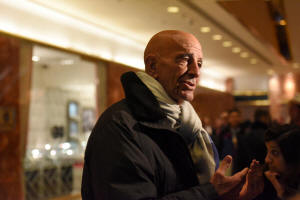Jury weighs whether Trump ally Barrack was a foreign agent and lied
about it
 Send a link to a friend
Send a link to a friend
 [November 03, 2022]
By Luc Cohen [November 03, 2022]
By Luc Cohen
NEW YORK (Reuters) -A U.S. jury began
deliberations on Wednesday in the trial of Tom Barrack, the onetime
private equity executive and fundraiser for former President Donald
Trump, on charges that he acted as a foreign agent for the United Arab
Emirates and lied to federal investigators.
Federal prosecutors in Brooklyn last year charged Barrack with using his
influence with Trump's 2016 presidential campaign and later his
administration to push the UAE's policy interests without notifying the
U.S. attorney general as required by law that he was acting as an agent
for the Middle Eastern country.
Barrack, 75, is also accused of obstruction of justice and making false
statements to FBI agents in 2019 about his interactions with Emirati
officials and their representatives.
He has pleaded not guilty and has described his interactions with Middle
Eastern officials as part of his role running Colony Capital, now known
as DigitalBridge Group Inc. Barrack testified in his own defense during
the trial, telling jurors he never agreed to be a UAE agent.
Barrack raised money for Trump during the 2016 campaign and chaired
Trump's 2017 inaugural committee.

After three hours of deliberations, U.S. District Judge Brian Cogan said
the jury had requested transcripts of Barrack's testimony regarding the
charges of lying to investigators.
Barrack testified last week that there were no questions he refused to
answer during the FBI interview.
"I didn't believe this was an inquisition," Barrack said.
During the six-week trial, prosecutors displayed hundreds of text
messages and emails they said showed that Emirati officials gave Barrack
input on what he should say in television interviews and an op-ed
article about the Middle East, and that Barrack passed along sensitive
information about U.S. foreign policy.
[to top of second column]
|

Tom Barrack speaks with members of the
press at Trump Tower in New York City, U.S. January 10, 2017.
REUTERS/Stephanie Keith/

The OPEC member nation paid Barrack back in 2017 and 2018 by
investing $374 million from its sovereign wealth funds with his
company, then known as Colony Capital, prosecutors said.
Barrack's lawyers did not dispute that he had been in touch with
Emirati officials and occasionally sought their feedback, but they
said any impact on U.S. policy or public opinion was insignificant.
"Try, just try to figure out where in this case you heard anybody
who talked about real policy that was affected," Randall Jackson, a
lawyer for Barrack, said in his closing argument on Tuesday.
Jackson said Emirati investments represented less than 1% of
Colony's balance sheet. He said that while Barrack, who is of
Lebanese descent, wanted better U.S. relations in the Middle East,
he never agreed to act subject to the UAE's "direction or control,"
as U.S. law defines agents for foreign governments.
Sam Nitze, a prosecutor, countered in a rebuttal that Emirati
officials were "thrilled" at Barrack's comments about the country
and its leaders during television interviews. Nitze said the law was
designed to make sure the U.S. government knew when someone was
acting as a "mouthpiece" for a foreign government.
(Reporting by Luc Cohen in New York; Editing by Will Dunham and
William Maclean)
[© 2022 Thomson Reuters. All rights
reserved.]
This material may not be published,
broadcast, rewritten or redistributed.
Thompson Reuters is solely responsible for this content.
 |